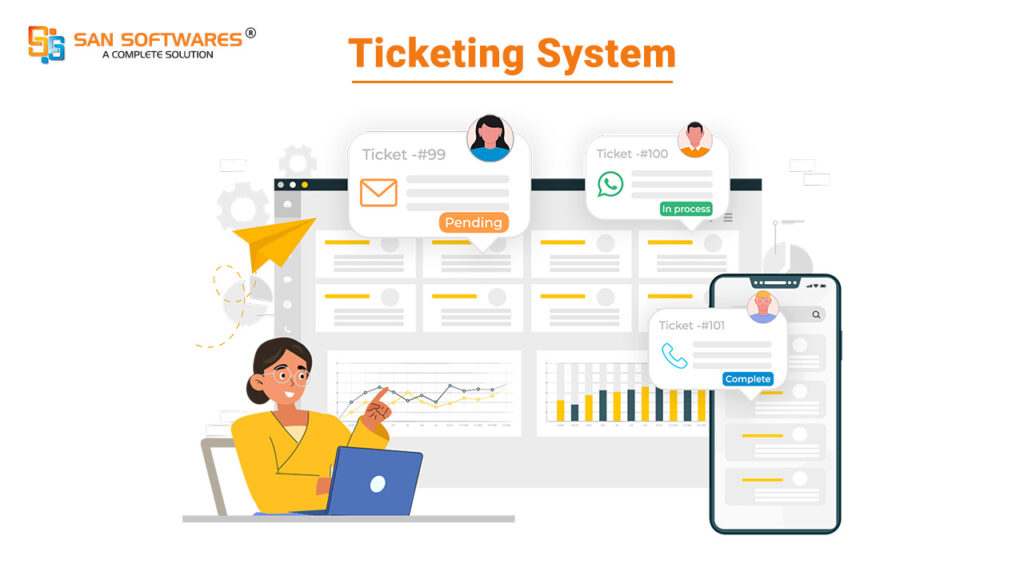Efficient customer assistance is critical to small business operations. For many years, this function has been fulfilled by conventional ticketing systems, which frequently need paper forms or tickets. However the emergence of online ticketing systems has signaled the start of a new age brought about by technological advancements. These digital channels provide a more simplified, effective, and frequently more efficient method of handling consumer contacts.
Recognizing Conventional Ticketing Systems
Conventional ticketing systems are often used to manage customer service requests, issues, or support tickets. These systems are designed to streamline the process of tracking, assigning, and resolving inquiries efficiently. Key characteristics of conventional ticketing systems include:
- Ticket Creation: Tickets can be created manually by support agents or automatically through various channels like email, phone, or web forms.
- Categorization & Prioritization: Tickets are categorized based on the issue and prioritized by urgency or impact, ensuring critical tasks are addressed first.
- Ticket Assignment: Tickets are assigned to specific teams or agents based on expertise, availability, or workload.
- Tracking and Escalation: The system tracks the status of each ticket from open to resolved, allowing escalation if necessary.
A manual procedure is usually used in traditional ticketing systems for small businesses. Consumers would use paper forms or tickets to submit their requests or problems to small firms. Following that, these tickets were gathered, classed, and allocated to the appropriate staff members. Though it worked, there were several problems with this approach. It took a lot of time, was prone to mistakes, and frequently lacked the scalability and efficiency needed in the fast-paced commercial world of today.
Online ticketing systems’ benefits
A more contemporary and effective method is provided by online ticketing systems for small businesses. Several of the procedures involved in traditional ticketing are automated by these systems thanks to technological advancements. Through a website or a mobile app, customers can electronically submit their questions or grievances. These tickets are automatically forwarded, upon submission, to the relevant department or employee by predetermined protocols.
Online ticketing systems offer a range of benefits, especially for businesses that handle customer support, events, or service management. Here are some of the key advantages:
1. 24/7 Accessibility
- Customers can submit tickets at any time, even outside business hours, ensuring uninterrupted service and responsiveness.
2. Improved Efficiency
- Automates ticket creation, categorization, and assignment, reducing the need for manual interventions and speeding up resolution time.
3. Enhanced Customer Experience
- Offers a convenient and streamlined way for customers to get support or service without waiting on calls or navigating complex processes.
4. Centralized Communication
- Provides a single platform where all communication regarding a specific issue is documented, making it easy to track progress and follow up on any queries.
5. Ticket Tracking & Monitoring
- Allows both customers and service teams to track the status of tickets, offering transparency and reducing uncertainty.
The potential of online ticketing systems to raise consumer satisfaction is among its biggest benefits. Customers may submit and track tickets with ease because of these systems’ easy and easily accessible platform. Furthermore, online ticketing systems sometimes include real-time updates and automatic alerts to keep clients updated on the progress of their requests.
Essential Elements of Online Ticketing Systems
Several features are available in online ticketing systems for small businesses that help improve customer support operations:
- Ticket submission: Using a mobile app or web interface, customers may quickly submit tickets.
- Ticket routing: By pre-established guidelines, tickets are automatically sent to the most suitable employee or division.
- Ticket tracking: Staff members and customers may monitor the status of tickets to guarantee prompt resolution.
- Knowledge base integration: A knowledge base may be combined with many online ticketing systems for small businesses to help clients find answers to frequently asked topics without submitting a ticket.
- Analytics and reporting: Online ticketing systems may offer insightful data on the effectiveness of customer service, enabling companies to spot patterns, gauge productivity, and enhance procedures.
Selecting the Appropriate Ticketing System For Small Businesses
It’s important to give serious thought to your small business’s ticketing system selection. The following are some things to consider:
- Ease of utilization: Employees and consumers should find it easy to utilize the system.
- Features: Verify that the system has the functionality you want, including automation, ticket prioritization, and connectivity with other business tools.
- Scalability: Take into account the potential for development in your company and select a system that will allow for future expansion.
- Cost: Consider the outlay for the license as well as continuing expenses for upkeep and assistance.
- Integration Capabilities: The solution should easily interface with the email platforms and CRM programs you now use.
Ticketing Systems’ Future
As technology advances, we should anticipate seeing even more creative ticketing solutions appear. Automation of processes like ticket routing and classification is already accomplished with the use of artificial intelligence (AI) and machine learning. In the future, a lot of common consumer questions may be handled by AI-powered chatbots, freeing up human agents to work on more difficult problems.
New Online Ticketing System provide more effective, efficient, and customer-oriented approaches than old ticketing systems that have been utilized in the past. By carefully considering your company’s particular needs and selecting appropriate technologies for their implementation, online ticketing systems may prove more successful in increasing customer support operations and overall satisfaction with customers.


